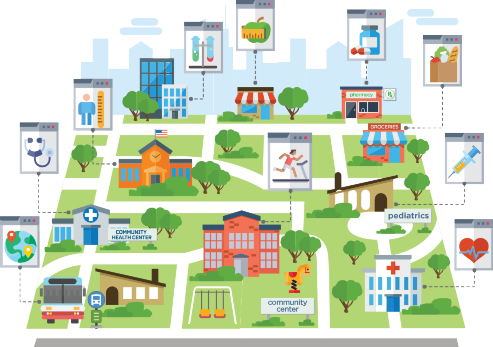
Childhood Obesity Data Initiative: Technical Information Sheet
Childhood obesity affects almost 14 million US children and is associated with serious and costly immediate and future health risks, lower academic achievement, and poorer mental health. Research that assesses childhood obesity interventions is hindered by limitations in the ability to link children’s records across systems where health-related data are captured.
To harness pediatric data across multiple sectors and systems to help improve research and surveillance opportunities while preserving data privacy.
To improve data capacity for childhood obesity research, the Centers for Disease Control and Prevention (CDC), funded by the Patient-Centered Outcomes Research Trust Fund, is leading the Childhood Obesity Data Initiative (CODI). CODI leverages existing information technology (IT) tools in innovative ways to facilitate access to individual-level, linked, longitudinal data. Data types may include demographics, clinical, and census information such as neighborhood socioeconomics. The information captured includes clinical health outcomes, results from a child’s participation in a clinical or community weight management intervention, and individual and community risk factors. Access to such individual-level linked data can:
-
Enable multisector patient-centered outcomes research on whether interventions work.
-
Align evidence-based interventions with the needs of patients and communities.
-
Improve the timeliness and geographic specificity of public health surveillance using local multisector data within distributed networks.
-
Enhance data capacity for healthcare quality improvement and program evaluation.

To achieve improved data capacity for childhood obesity research, CODI will:
- Enable access to standardized child obesity-related data elements sourced from different IT systems and health-related sectors.
- Link individual-level records across organizations while maintaining individuals’ privacy.
- Create longitudinal individual-level records to support obesity comparative effectiveness analyses and public health surveillance.
Expand access to standardized multisector data elements CODI members are working with clinicians, informaticists, program managers, and public health staff to better understand data needs for patient-centered outcomes research and how to use information for local surveillance. Currently, necessary childhood obesity data are found in a variety of sources: healthcare organizations’ electronic health records, health insurers, clinical and community settings, social services organizations, and the US Census.
CODI standardizes a set of data tables to supplement the existing Patient-Centered Outcomes Research Network (PCORnet) common data model. CODI will pilot access to the existing clinical and the expanded set of intervention, social health determinants, and geographic data associated with individuals’ participation in weight-related programs.
Individual-level record linkage that preserves privacy
Currently, PCORnet retrieves information from organizations across a network but does not deduplicate or link those data at the individual level. As a result, studies may be limited by issues such as an individual being counted multiple times or a lack of follow-up information if an individual moves between health organizations.
CODI solves these problems by supporting privacy-preserving record linkage (PPRL). Through PPRL, each organization shares information about individuals, but before that information leaves the organization’s firewall, the data are encoded to make it impossible to determine the personally- identifiable information that is shared in a network. Plain-text personally-identifiable information remains secure within the organization’s IT system.
Longitudinal record that facilitates research, evaluation, and surveillance
Through CODI, scientists will access information about individuals across IT systems and sectors. Using these individual-level longitudinally-arranged data enables examination of childhood obesity prevalence, and pre-and post-effects of obesity screening and interventions among subpopulations of children. CODI scientists will be able to answer questions like:
- When is obesity screening occurring? In what settings? What actions does it trigger, including screening for co-occurring conditions?
- What “dose” and characteristics of weight management interventions are associated with effectiveness?
- What is the prevalence of childhood obesity in the geographic area of interest and across subpopulations?

Three major healthcare systems in the Denver, Colorado metro area, in partnership with the local public health authority and community partners, will pilot CODI. These healthcare organizations serve much of the metropolitan’s pediatric population. Through a collaborative of local, regional, and national stakeholders, end-user feedback on all products is incorporated to facilitate the spread and scale of CODI to other geographic locations, populations, and health IT systems. This first phase, during 2018-2020, will test CODI’s ability to improve data capacity for childhood obesity research; subsequently, phases will assess and refine CODI in additional populations and locations.
